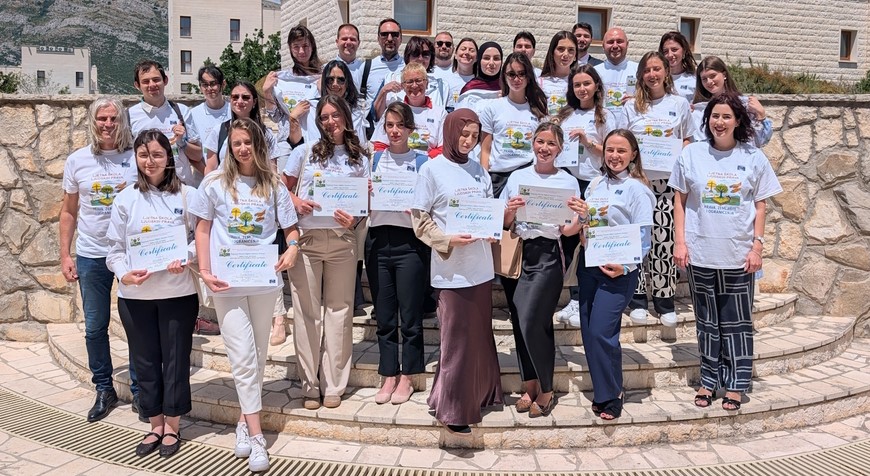31 law students from Albania, Bosnia and Herzegovina, Montenegro, North Macedonia, Serbia, and Kosovo* gathered this week in Trebinje, Bosnia and Herzegovina, for the Regional School of Human Rights - a specialized educational programme designed to deepen their understanding of human rights standards beyond the standard university curriculum.
The focus of this year's Regional School was the right to peaceful enjoyment of one’s possessions under the European Convention on Human Rights (Article 1 of Protocol 1 to the Convention). A further emphasis was placed on the intersection between property rights and environmental protection - an increasingly pressing issue as the region, and indeed the world, faces the combined challenges of climate change, environment pollution, and biodiversity loss.
Misenida from Albania, participant of the Regional School, said that law students do not often have an opportunity to discuss this topic, both in their universities but also in other projects and activities, making this week’s lectures and discussions very useful.
Over the course of a week, participants engaged in intensive discussions, interactive workshops, and practical exercises that unpacked the complexities of property rights under European human rights legal standards, with a particular focus on the delicate balance between the protection of property and the broader public interest.
Students explored real-world jurisprudence from the European Court of Human Rights to learn about the criteria applied by the Court in dealing with this complex issue. Several participants particularly highlighted the importance of this approach, as the regular curriculum does not often offer a chance for a detailed overview of individual articles, protocols and international treaties: “I will be able to apply the knowledge about Article 1 of Protocol 1 when I go back home, both at the university, but also in the internship programme I am currently part of,” says Medina from Kosovo.
Interactive sessions allowed students also to apply their theoretical knowledge to practical scenarios. The programme culminated in a moot court simulation where students themselves analysed, prepared, and elaborated hypothetical cases involving relevant topics such as exploitation of natural resources, environment protection, land and water pollution, and waste management, using real-life global legal trends: international case law, legal treaties, and human rights standards.
Ivona from North Macedonia, participant of the School, particularly welcomed the combination of theoretical and practical approach: “I learned much from this school and am truly thrilled. Lectures were very professional, there was a lot of teamwork. The results are very positive because we cannot have practice without theory, and vice versa.”
“This was also an excellent opportunity to meet new people, because networking is very important, and to learn something new – as the topic is very timely and important, and is not discussed enough,” added Ana from Montenegro.
This year’s topic is especially timely. The new Council of Europe Convention on the Protection of the Environment through Criminal Law, a legally binding treaty designed to address environmental crime, is set to become a key instrument in confronting the triple planetary crisis of climate change, pollution, and biodiversity loss. Against this backdrop, it is vital to understand the human rights implications of environmental regulations.
“For me, it was very useful to learn about these new trends in European law, new rulings by the European Court of Human Rights which are setting a precedent and reflect new directions in law,” remarked Filip from Serbia. Merjem from Bosnia and Herzegovina agrees, adding: “The interconnection with the environmental aspect is very important, we are talking about a new generation of positive law that emerged sometime in the 70s. In general, because of the global situation, this aspect, and the days we spent learning about it, can be of great use.”
By offering a focused, experiential learning environment, the Regional School equips future legal professionals with vital tools for successful academic and professional work, as well as in-depth knowledge on international human rights mechanisms.
The Regional School of Human Rights was organised as part of the Council of Europe project Support to a coherent national implementation of the European Convention on Human Rights and facilitating the execution of judgements of the European Court of Human Rights in Bosnia and Herzegovina, funded under the Action plan for Bosnia and Herzegovina for the period 2022-2025, in cooperation with actions implemented by the Council of Europe under the joint programme of the European Union and the Council of Europe Horizontal Facility for Western Balkans and Türkiye, co-financed by the European Union and the Council of Europe: Towards a Consolidated and More Efficient Free Legal Aid (FLA) System in North Macedonia, Strengthening human rights protection in Serbia, Strengthening accountability of the judicial system and enhancing protection of victims' rights in Montenegro, Improving the protection of the right to property and facilitating execution of ECtHR judgments in Albania (D-REX III), as well as the Council of Europe regional project Human Rights and Sustainable Environment in South-East Europe and the project in Kosovo Support to the Constitutional Court in Applying and Disseminating European Human Rights Standards – Phase II.
* This designation is without prejudice to positions on status, and is in line with UNSCR 1244 and the ICJ opinion on the Kosovo Declaration of Independence.

